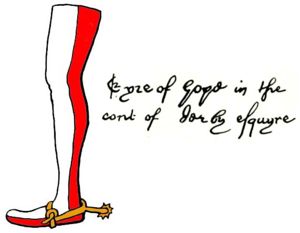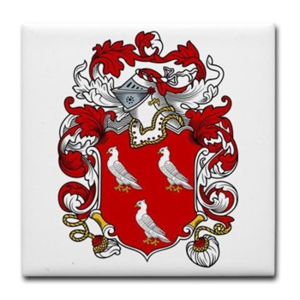- Profile
- Images
Date:
[unknown]
[unknown]
Location: [unknown]
Surname/tag: Ayer
Location: [unknown]
Surname/tag: Ayer
This page has been accessed 1,607 times.
This profile is part of the Ayer Name Study.
Origin of the Name(s)
- The Legend of Truelove - The fanciful family legend states that the founder of the Eyre and Ayre families was known as Truelove. In one version of the story, he accompanied William the Conqueror to Britain during the Norman Invasion, and fought alongside him at the Battle of Hastings (14 October 1066). During the battle, it is said that William was thrown from his horse and his helmet was driven into his face, suffocating him. Our hero, Truelove, however, was able to remove the helmet and save William's life. After the battle William supposedly told him, "thou shalt hereafter instead of Truelove be called Eyre, because thou hast given me the air I breathe." Unfortunately, Truelove was also severely injured in the battle and had to have an entire leg amputated. [1]
- Another variation of the Truelove story states that he is a grandson of King Edmund II of England and a second cousin of William the Conqueror. In this version he was called "Heyr" because he was an heir to the English throne. [1]
- In both versions, Truelove the "Eyr" or "Heyr" was granted land in Derby as a reward for his services, together with a Coat of Arms featuring "a human leg in Armour couped at the thigh quarterly argent and sable spurred", [2] in reference to the sacrifice of his limb.

|
| Crest of Eyre of Hope |
- Some of these features may persist in one of the current Eyre coats of arms, which features three gold quatrefoils on a black chevron with a white background. [1]

|
| Arms of Captain John Eyre of Eyrecourt |
- In the example above, the traditional Eyre arms (left side of shield) are shown impaled with those of Bigoe (right side). [3]
- In another variation of the story, the hero is Humphrey le Heyr of Bromham. He is said to have gone on crusade with Richard Coeur de Lion, who Humphrey is said to have rescued during the siege of Ascalon. It is during this battle that Humphrey lost his leg and was granted a crest of a leg couped in remembrance of the occasion. [1]
- While many historians reject this legend as myth [4] for lack of any definitive historical evidence confirming the existence of this person. It is noted, however, that Burke's Peerage of 1937 records seven branches of landed gentry all claiming links back to Truelove; and four separate grants of arms all include a couped leg in armour as their crest as a reference to the "legend." [1]
- Meaning of the Name(s) - This long-established surname is of early medieval English origin, and has two distinct possible sources, each with its own history and derivation.
- Firstly, Ayres may be a patronymic form of "Ayre", itself a nickname for a man who was well known to be the heir to a title or fortune, deriving from the Middle English "eir, eyr", heir (Old French "(h)eir", Latin "heres", heir). [5] Variants include Ayr, Ayre, Eyer, Eyre, Hayer, Heyer , among others. [6]
- It is noted that one Ralph le Eir was noted in the 1208 Feet of Fines for Essex, and a Richard le Heyre appears in the 1273 Hundred Rolls of Gloucestershire. [7]
- The second possibility is that Ayres is a patronymic form of the Middle English personal name "Aier, Aer", itself coming from the Olde English pre 7th Century "Ealhhere", a compound of the elements "eal(h)", old, and "heri", army.
- It is noted that Robertus filius (son of) Aier was found in the 1166 Red Book of the Exchequer, and a Robert Aier in the 1201 Pipe Rolls of Shropshire.
- In the modern idiom the surname has several spelling variations ranging from Ayers, Ayres, Ayris, Ayars and Air(e)s, to Eayrs, Eyres and Eyers, the final "s" indicates the patronymic, and is a reduced form of "son of".
- John Ayres was a noted penman, who between 1680 and 1700 introduced the Italian hand into England; he published many calligraphic works including "A Tutor to Penmanship", 1698. [7]
- Symon Ayres, "chirurgeon", aged 48 yrs., who embarked from London on the ship "Increase" bound for New England in April 1635 was one of the earliest recorded namebearers to settle in America. [7]
- The first recorded spelling of the family name is shown to be that of Henry Ayer, which was dated 1273, in the "Hundred Rolls of Lincolnshire", during the reign of King Edward 1, known as "The Hammer of the Scots", 1272 - 1307. [7]
- England, Scotland, & Ireland - The AYRE name (of that spelling) is comparatively rare throughout the world and has independent origins in England and Scotland. A sampling of census records suggests that AYR is Scottish; AYRE, while found in both, is found more frequently in England than in Scotland; and that AYRES, EYRE, and EYRES are predominantly English. The AYER spelling, however, seems almost exclusively American now. [4]
- In England, the evolution of the name is believed to be le Heyr - le Eyr - Eyre - Eyres and the variations are Eyre(s) and Ayre(s). Some think the original 'le Ayer' may have been the occupational (a judicial official) origin of Ayre in England. [4]
- The highest concentration of Ayre families (of that spelling) in the UK is in the north east of England, in neighbouring Sunderland, Houghton-le-Spring and Durham. Outside of Great Britain the geographical spread in descending occurrences is Northern Ireland, Australia, Canada, and the USA. The surname Ayre in Ulster (Northern Ireland) is of lowland Scottish origin, as would be expected from the vast emigration to the eastern counties of the province from 1400 onwards. It is estimated that at least 200 000 lowland Scots settled in Ulster during the Ulster Plantation scheme of 1605-97. There are no modern occurrences recorded in the Republic of Ireland. [4]
- The large EYRE and EYRES families in England were landed, armigerous and prosperous, and remained in locations such as Hope in Derbyshire. In Ireland, the landed and armigerous EYRE family (Eyreville, Eyrecourt, Eyrecourt Castle) originated in England during Cromwellian times. [4]
- In Ayrshire, Scotland, the county and the town take their name from the river Ayr. The origin of the name Ayr may be from Gaelic ar meaning clear, or derived from the Old Norse eyrr (a strip of shingle beach), or from an early pre-Celtic Indo-European stratum of river names. The river Ayr has had different spellings over time, namely Ar c.1177, Are 1197, Air c.1230, Ayre 1237, and Aare c.1400. Scottish surnames with these spellings are believed to denote persons who came from Ayr. As a result, in Scotland, the name variations are Air, Ayr and Ayre, seen in early records as 'de Are' and 'de Ayr', (which supports the claim of an Ayrshire territorial origin). The Ayr families are historically from Kilmarnock, Ayrshire, and vicinity. [4]
- The AYR(E) families were not of the highlands. Of the name variations AIR(E) and AYR(E), the former are seemingly associated with Angus and Berwick, and the latter near the river and town of Ayr in Ayrshire. It is believed that the AYR(E) families of Ayrshire were a sept of clan Boyd, but this has never been verified.[4] In general those of the AYR or AYRE name of Scottish origin are few in numbers and widespread internationally. The surname, spelled as Ayer, however, is listed as a sept of clan Hay. [1] [4]

|
| Ayer Coat of Arms |
- These persons, recorded at various dates, testify to the antiquity of Ayre surname variations in the lowlands of Scotland: [4]
- Robert Air of Hederslawe, Berwickshire, 1281.
- Reginald of Ayr, Clerk in Ayr, 1287.
- Johan Ayr of Ayton, Berwickshire, 1296 (visit the Ragman Rolls here).
- John of Ayr, Chaplain of St.John the Baptist Church at Ayr, 1301.
- Aubinus de Are, 1315-21.
- Thomas Ayre, Provost of Kintore, 1331.
- Elyas Ayr 1336.
- Geoffrey Ayre, Baillie of Dundee, latter 1370s, mentioned in the Exchequer Rolls.
- Margaret Stewart, Countess of Mar and Angus received a charter from Robert Ayre of Fastforeland, Berwickshire in 1375.
- Walterus de Are, 1399.
- Richard, Brice, Henry and William Ayre, 1401.
- Dogall de Are, 1430.
- Michael Ayr, Johannem de Ayr, Brechin, 1450.
- William Ayr, lands in the Lordship of Dunbar, 1522, 1535.
- William Ayre, Jacobite prisoner, transported to Maryland on 'Friendship', May 1716, arrived August 1716.
- George Ayre, son of a Scottish immigrant, established the Ayrshire Plantation in Virginia, in 1821.
- Netherlands - We note that a few of the spelling variations seem to be associated primarily with immigrants from the Netherlands, such as Aries. These names tend to be patronymic, for example, the name, Ariesen simply means "son of Aris." [8] And the name "Aries" represents a child of "Arie." [9]
Collaboration
- Login to edit this profile and add images.
- Private Messages: Send a private message to the Profile Manager. (Best when privacy is an issue.)
- Public Comments: Login to post. (Best for messages specifically directed to those editing this profile. Limit 20 per day.)
Comments
Leave a message for others who see this profile.
There are no comments yet.
Login to post a comment.